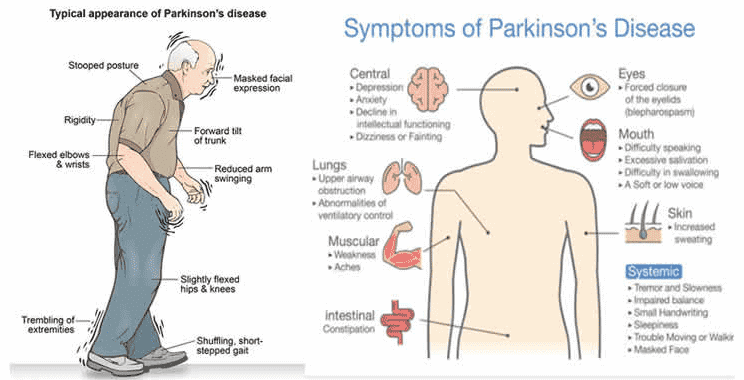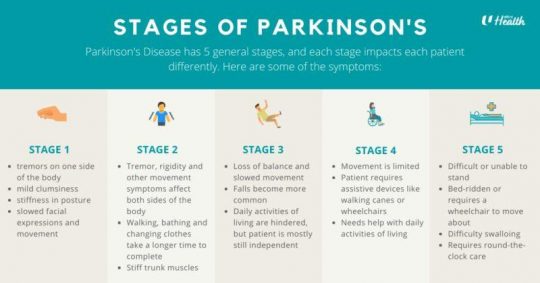Understanding Parkinson’s Disease: A Guide for Families
Published on October 23, 2023
Updated on May 2, 2024
Published on October 23, 2023
Updated on May 2, 2024

Table of Contents
If you have a loved one diagnosed with Parkinson’s disease, you may have many questions and concerns about what to expect and how to provide the best care possible. As an experienced hospice nurse with extensive experience in managing terminal illnesses, I am here to guide you through the journey of Parkinson’s disease and offer compassionate support. In this article, we will explore Parkinson’s disease, the changes your loved one may experience over time, and practical tips to care for them from the onset to the end-of-life phase.
Parkinson’s disease is a progressive neurological disorder that affects movement. It occurs when dopamine-producing brain cells are lost, leading to motor and non-motor symptoms. Parkinson’s is a chronic and gradually worsening condition, but each person’s experience with the disease is unique. Here are some key points to understand:
These are physical symptoms that affect movement and may include:
Parkinson’s can also cause non-motor symptoms that impact various aspects of life, such as:
As Parkinson’s disease progresses, your loved one may experience a range of changes in their physical, emotional, and cognitive health. It is essential to be prepared for these changes and adjust your caregiving approach accordingly.
Some healthcare providers will refer to the five stages of Parkinson’s’, where “early” mentioned above are stages 1 and 2, middle as 3, and advanced as 4 and 5. Stage 5 is where hospice is typically involved, as the patient is terminal at that point. Let’s break down those stages.

Caring for a loved one with Parkinson’s disease can be challenging, but with empathy and understanding, you can provide meaningful support throughout their journey. Here are some practical caregiving tips:
Parkinson’s disease is a condition that affects the brain and the nerves. It can cause problems with movement, balance, speech, and mood. Parkinson’s disease gets worse over time, but the speed and the severity of the changes can vary from person to person.
Learning about Parkinson’s disease can help you and your loved one cope better with its challenges. You can find reliable information from the Parkinson’s Foundation or the National Parkinson Foundation. They offer free educational materials, such as books, videos, and webinars, that explain the disease’s symptoms, treatments, and stages. You can also talk to your loved one’s doctor, nurse, or therapist to get answers to your questions and concerns.
Physical activity is important for people with Parkinson’s disease. It can help them keep their muscles strong, joints flexible, and balance stable. It can also improve their mood, energy, and sleep quality.
You can help your loved one stay active by encouraging them to exercise safely and suit their abilities. You can ask their healthcare provider for recommendations or join a class or program designed for people with Parkinson’s disease. Some examples are dance, boxing, yoga, and tai chi. You can also do simple activities with your loved one, such as walking, gardening, or playing games.
Medication is a key part of the treatment for Parkinson’s disease. It can help reduce the symptoms and improve the quality of life for your loved one. However, medication can also have side effects, interactions, and timing issues that need to be monitored and managed carefully.
You can help your loved one take their medication correctly by following these tips:
As Parkinson’s disease progresses, your loved one may face difficulties with daily tasks and activities at home. They may have trouble with walking, reaching, gripping, or dressing. They may also be at risk of falling, freezing, or choking.
Changing their environment can help your loved one live more comfortably and safely at home. Here are some examples:
Social isolation and loneliness are common problems for people with Parkinson’s disease. They may feel embarrassed, depressed, or anxious about their condition. They may also lose touch with their friends, family, or community.
You can help your loved one stay connected and engaged by encouraging them to socialize and participate in activities they enjoy. You can:
Parkinson’s disease can affect not only the physical but also the emotional well-being of your loved one. They may experience mood swings, depression, anxiety, anger, or apathy. They may also have cognitive changes, such as memory loss, confusion, or dementia.
You can help your loved one cope with their emotions and thoughts by offering support and understanding. You can:
Nutrition is essential to care for people with Parkinson’s disease. A balanced diet can help them maintain weight, strength, and energy. It can also help them prevent or manage other health problems, such as diabetes, high blood pressure, or constipation.
You can help your loved one eat well by following these tips:
Caring for a loved one with Parkinson’s disease can be rewarding but also challenging, stressful, and exhausting. You may feel overwhelmed, frustrated, or guilty at times. You may also neglect your health, happiness, and well-being.
You can help yourself and your loved one by seeking help when needed. You can:
If you have a loved one diagnosed with Parkinson’s disease, you may be exploring complementary approaches to manage their symptoms. One such avenue is the use of herbal supplements like Bacopa monnieri. While not a cure, these supplements may offer some relief and support in dealing with the challenges Parkinson’s presents. Here, we’ll explore the potential benefits of Bacopa monnieri and other herbal options.
1. Background: Bacopa monnieri, also known as Brahmi, is an Ayurvedic herb with a history of traditional use in India.
2. Parkinson’s Disease: Research suggests that Bacopa monnieri may benefit people with Parkinson’s disease by improving circulation to the brain.
3. Cognitive Enhancement: It’s considered a nootropic, which may support cognitive function, potentially helping with memory and concentration.
Aside from Bacopa monnieri, several other herbs have been explored for their potential benefits in managing Parkinson’s symptoms. These include:
1. Mucuna pruriens (Velvet Bean): This herb is rich in L-DOPA, a precursor to dopamine, and has shown promise in alleviating motor symptoms.
2. Withania somnifera (Ashwagandha): Known for its adaptogenic properties, it may help manage stress and anxiety, which is common in Parkinson’s patients.
3. Centella asiatica (Gotu Kola): This herb is believed to support cognitive function and overall brain health.
While herbal supplements like Bacopa monnieri and others may offer some relief for Parkinson’s symptoms, it’s crucial to consult with a healthcare provider before incorporating them into your loved one’s care plan. These supplements are not a replacement for prescribed medications or other conventional treatments. Always discuss complementary approaches with a medical professional to ensure they are safe and appropriate for your loved one’s situation.
Navigating Parkinson’s disease requires knowledge, empathy, and adaptability. By embracing a holistic caregiving approach and being open to complementary strategies, families can provide meaningful support throughout their loved one’s journey. Remember, seeking professional advice, staying informed, and fostering a supportive community are key elements in this challenging yet profoundly important undertaking.
Parkinson’s Disease Foundation
Parkinson’s Disease and Caregiving
Parkinson’s Disease in Hospice Care: Advanced Parkinson’s Disease (Video)
Finding Resources for Parkinson’s Disease
10+ Facts About Parkinson’s Disease: Plus common misconceptions about what it’s like
Experts reveal symptoms of Parkinson’s disease
Long-Term Treatment with High-Dose Thiamine in Parkinson Disease: An Open-Label Pilot Study
Important medicinal herbs in Parkinson’s disease pharmacotherapy
Highly informative Video: Neurologist Reveals the SHOCKING ROOT CAUSES of Parkinson’s & How to PREVENT IT | Dr. Ray Dorsey
Bacopa monnieri in Patients with Parkinson’s Disease: A Pilot Study
Parkinson’s Disease: An update on what causes it and new treatments (YouTube)
The Importance of Caregiver Journaling
Reporting Changes in Condition to Hospice
CaringInfo – Caregiver support and much more!
Surviving Caregiving with Dignity, Love, and Kindness
Caregivers.com | Simplifying the Search for In-Home Care
As an Amazon Associate, I earn from qualifying purchases. The amount generated from these “qualifying purchases” helps to maintain this site.
Take Back Your Life: A Caregiver’s Guide to Finding Freedom in the Midst of Overwhelm
The Conscious Caregiver: A Mindful Approach to Caring for Your Loved One Without Losing Yourself
Everything Happens for a Reason: And Other Lies I’ve Loved
Final Gifts: Understanding the Special Awareness, Needs, and Communications of the Dying
Providing Comfort During the Last Days of Life with Barbara Karnes RN (YouTube Video)
Preparing the patient, family, and caregivers for a “Good Death.”
Velocity of Changes in Condition as an Indicator of Approaching Death (often helpful to answer how soon? or when?)
The Dying Process and the End of Life
As an Amazon Associate, I earn from qualifying purchases. The amount generated from these “qualifying purchases” helps to maintain this site.
Gone from My Sight: The Dying Experience
The Eleventh Hour: A Caring Guideline for the Hours to Minutes Before Death